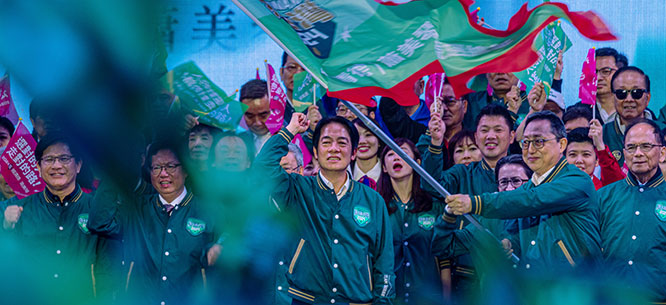Taiwan’s Election Under China’s Shadow
Taiwan’s Election Under China’s Shadow
The Democratic Progressive Party’s candidate is more conservative than his predecessor, but the best hope for progressive forces this Saturday is still a DPP victory.

When Taiwanese people go to the polls this Saturday, cross-strait relations are not the only issue they will vote on. The midterm elections in 2022 hinged on questions of local administration, and the country faces numerous domestic challenges. But in presidential elections, Taiwanese voters have recently tended to choose the candidate they believe will allow Taiwan to maintain its democratic political system and its de facto independence from China.
The two main political parties in Taiwan are the ruling Democratic Progressive Party (DPP), which favors Taiwanese independence, and the Kuomintang (KMT), also known as the Chinese Nationalist Party. Although the DPP is considered center-left and the KMT center-right, Taiwan’s two-party system is defined by the question of independence versus unification. The KMT’s long commitment to a pro-unification stance helped spur the DPP to victory in the last two elections.
Since 2022, when Nancy Pelosi became the first U.S. Speaker of the House to visit Taiwan in a quarter-century, there has been an escalation in Chinese military threats directed at Taiwan. But Taiwanese people remain largely unfazed. Before a blackout period on reporting on polls ten days before the election, the DPP’s new candidate, current Vice President Lai Ching-te, maintained a narrow lead. Lai is more conservative than the sitting president, Tsai Ing-wen, but he is likely to continue Tsai’s moderate policies on cross-strait relations, maintaining the status quo while eschewing any moves toward formal independence that would provoke China. If elected, the KMT has said it would restore cross-strait free trade agreements allowing for Chinese investment in Taiwan’s service sector, potentially threatening political freedom in Taiwan and leading to self-censorship by companies. These policies are unpopular with the public; opposition to previous trade agreements sparked the 2014 Sunflower Movement.
The emphasis on cross-strait politics makes it difficult to discuss the domestic problems facing Taiwan, including the inability of young people to afford housing, the declining birthrate, and the aging population. When it comes to addressing these issues, the two parties are closer in their policy approaches. In fact, each party accuses the other of stealing ideas on how to tackle demographic and socioeconomic challenges. (The major domestic issue that the two parties diverge on is nuclear energy; the KMT calls for a return to nuclear energy, while the DPP is reluctant because of Taiwan’s frequent earthquakes.)
As president, Tsai governed as a neoliberal technocrat. She pushed through changes to labor laws that undid decades of pro-labor reforms, cut public holidays, and oversaw the corporatization of Taiwan’s national railways. But she also made some socially progressive changes. During her two terms, Taiwan legalized same-sex marriage and apologized to indigenous people on behalf of the state. It also shored up international support from the United States and other Western countries. Lai is closer to the right wing of the DPP, and it is possible the party’s conservatives would be emboldened under his presidency to try to roll back some of these shifts.
Following the success of the Sunflower Movement, activists tried to launch new parties and political organizations that could offer a progressive alternative to the DPP. But these have largely petered out in the last five years because of fears that a split vote would result in the KMT returning to power. The DPP has leveraged such fears to draw individuals who previously sought to contest the party into its fold.
The future of the DPP is unclear. Past election cycles have seen successive groupings of progressive young candidates emerge from the DPP, along the lines of the “Squad” in the United States. The current iteration, termed the “Generation,” consists of post-Sunflower activists such as Lai Pin-yu, Wu Cheng, and one of the first openly lesbian politicians in Taiwan, City Councilor Miao Poya. It remains to be seen if young progressive politicians will be able to organize to become a force in the DPP. First, they need to win this election.
Brian Hioe (丘琦欣) is a writer, translator, and activist based out of Taipei. He was one of the founders of New Bloom Magazine (破土), an online magazine covering activism and youth politics in Taiwan and the Asia Pacific that was formed after the Sunflower Movement, in which he participated as a student-activist. He is currently a non-resident fellow at the University of Nottingham’s Taiwan Research Hub.





